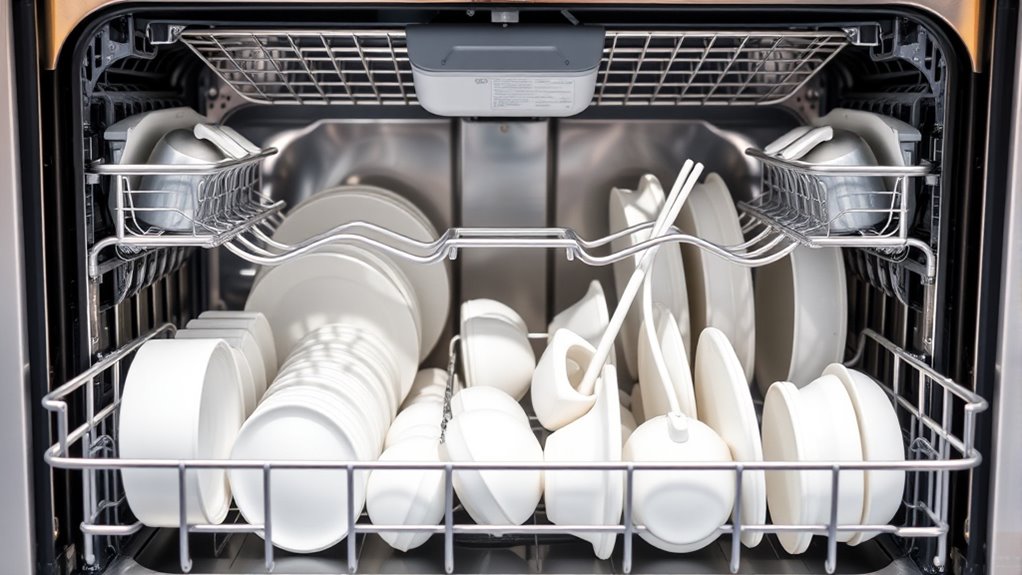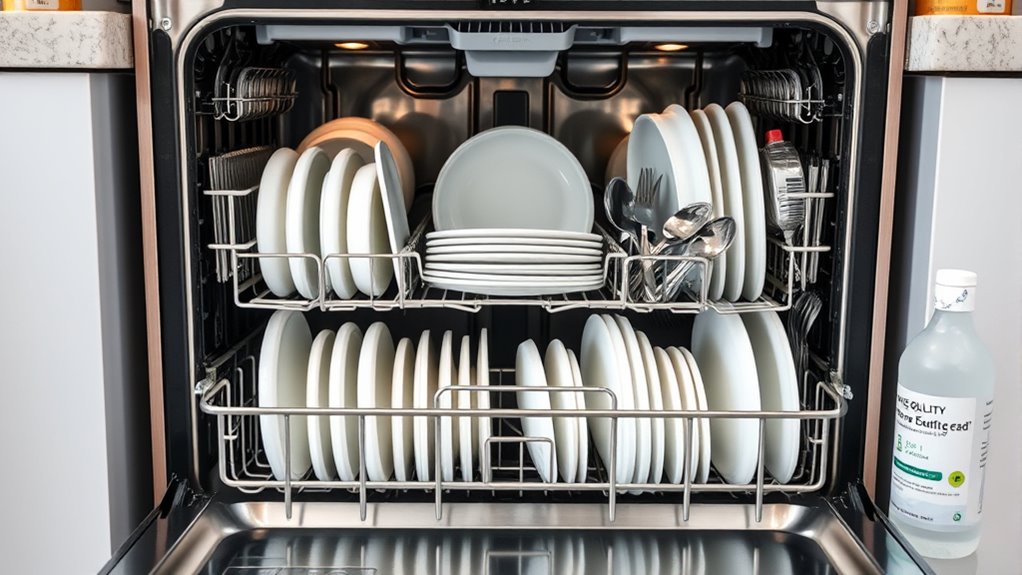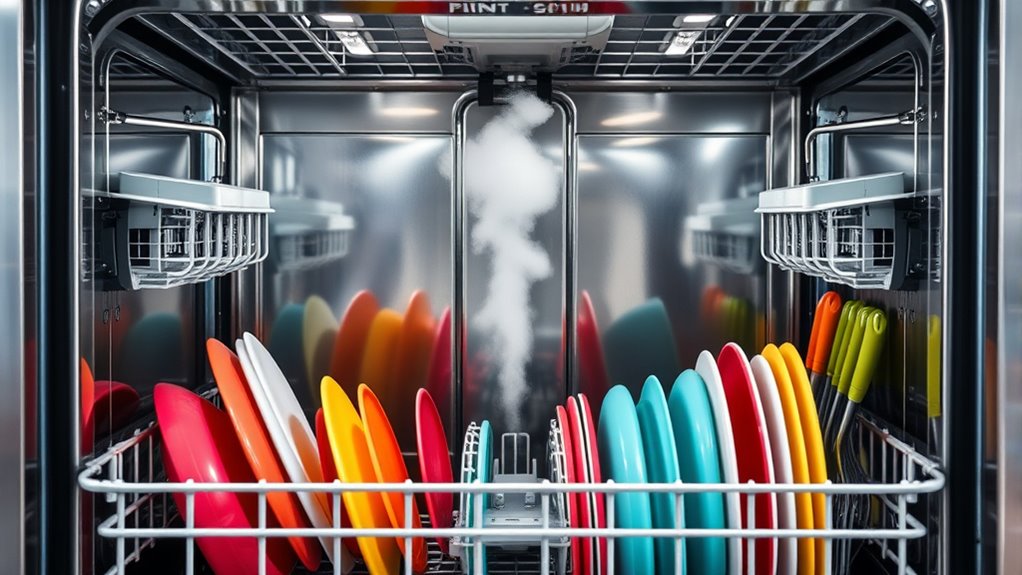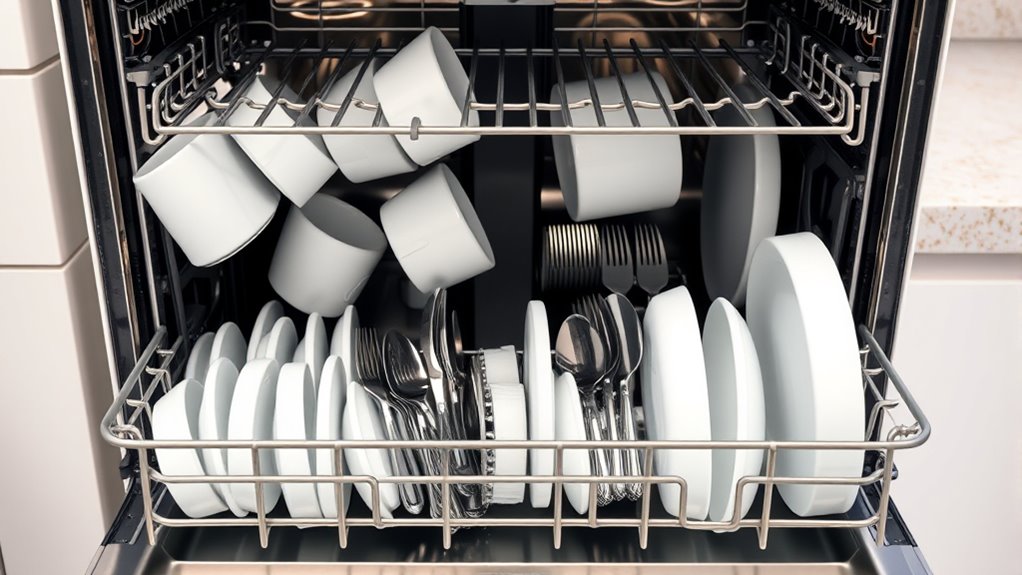To prevent dishwasher odors through proper loading, make certain dishes are arranged to promote water and air circulation. Place smaller items like mugs and bowls on the top rack, angling them for thorough cleaning. Keep larger items on the bottom without overlapping, and leave space between dishes to prevent trapped moisture. Regularly clean filters, spray arms, and run vinegar cycles to eliminate lingering smells. Follow these tips to keep your dishwasher fresh—more helpful insights await if you continue.
Key Takeaways
- Load dishes without overcrowding to ensure proper water flow and thorough cleaning, preventing odor-causing residue buildup.
- Place smaller items and utensils on the top rack and larger items on the bottom, spaced adequately to allow water circulation.
- Keep spray arms, nozzles, and filters clean and unobstructed to maintain optimal water flow and odor control.
- Remove food debris and scrape dishes before loading to prevent trapped residues that cause unpleasant odors.
- Leave the dishwasher door slightly ajar after cycles to promote airflow and moisture evaporation, reducing mold and odor formation.
Optimal Arrangement of Dishes for Effective Cleaning

To guarantee your dishwasher cleans effectively and prevents odors, you should arrange dishes strategically. Place smaller items like mugs, stemware, small plates, and bowls on the top rack to ensure they’re exposed to spray arms and get thoroughly cleaned. Larger items such as dinner plates, pots, pans, and mixing bowls go on the bottom rack, angled toward the center spray jets for ideal water coverage. Position cups and shallow items along the sides or less deep parts of the upper rack, with tall glasses toward the deeper area, resting against the tines. Make certain plates and bowls are nestled between tines without overlapping or nesting to prevent blocking water flow. Use third racks, if available, for utensils and small items to maximize space and enhance water circulation. Proper loading techniques maximize water flow help ensure all dishes are cleaned and dried properly, reducing the risk of odors and residue buildup.
Scraping and Pre-Rinsing Techniques to Minimize Residue

To prevent residue buildup, you should scrape off large food particles before loading your dishwasher. Using the right tools, like a soft brush or scraper, makes this process more effective and gentle on your dishes. Remember, consistent scraping and gentle pre-rinsing help keep your dishwasher running efficiently and odor-free. Proper loading techniques also contribute to reducing residue and maintaining a fresh smell in your dishwasher. Additionally, adopting space optimization strategies ensures proper circulation of water and detergent, further minimizing lingering odors. Incorporating regular home maintenance routines, such as cleaning filters and seals, can also help prevent unpleasant odors from developing.
Effective Scraping Methods
Effective scraping is essential for preventing dishwasher odors, as it removes food residues before they decompose and cause unpleasant smells. Use plastic putty knives or flexible wire tools to dislodge baked-on food without damaging stainless steel surfaces. Steel wire, like picture hanging wire, can clean spray arm holes thoroughly, while wire hangers help unclog spray arm jets. Removing the top and middle spray arms gives better access to clear debris from nozzles. Regularly inspect and mechanically remove debris from filters, spray arms, and nozzles to maintain ideal performance. For stubborn buildup, soak spray arms in white vinegar for at least 20 minutes, which dissolves soap scum and mineral deposits. Proper projector maintenance and cleaning techniques help ensure your dishwasher stays odor-free and runs efficiently. Incorporating proper loading techniques can further reduce residue buildup and improve cleaning performance. Combining these scraping techniques ensures your dishwasher stays odor-free and runs efficiently.
Pre-Rinse Best Practices
Pre-rinsing only when necessary can considerably reduce water and energy waste while maintaining cleaning efficiency. Focus on scraping off large food scraps into the trash or compost before loading your dishes. This prevents clogs and odors without wasting water on full rinses. If dishes have dried-on or stubborn residue, use a quick spray or short rinse inside the dishwasher instead of rinsing under the faucet. Running hot water at the sink before starting the cycle ensures the dishwasher begins with hot water, improving cleaning power. Avoid excessive pre-rinsing, as leaving some soil on dishes helps detergents activate properly, leading to better results. Keep pre-rinsing brief and targeted, and only when dishes are heavily soiled, to save water, energy, and prevent odors. Additionally, selecting a dishwasher with a superior filtration system can help reduce lingering odors and improve overall cleanliness. Using a dishwasher with an effective filtration system can also minimize the buildup of food particles and bacteria, further preventing odors over time.
Ensuring Proper Air Circulation and Drying After Cycles

Ensuring proper air circulation after dishwasher cycles is essential for thorough drying and odor prevention. Leaving the door slightly ajar promotes airflow, helping moisture evaporate and bacteria or mold growth diminish. Removing dishes promptly prevents moisture pockets, and avoiding overcrowding allows air to circulate freely. Check and clear filters and spray arms regularly to maintain optimal airflow. Blocked vents or air gaps hinder drying, so keep these components unobstructed. Additionally, ensuring the dishwasher’s air circulation system is functioning properly can significantly improve drying efficiency. Incorporating ventilation pathways in the dishwasher’s design can further enhance airflow and reduce residual moisture.
Selecting and Using Appropriate Detergents and Additives

Choosing the right detergent and additives can make a big difference in preventing dishwasher odors. Opt for tablets or pods, as they combine cleaning power with odor-fighting ingredients, and consider water hardness when selecting formulas. Using the correct amount and type of detergent helps keep your dishwasher fresh and free of lingering smells. Additionally, selecting appropriate cleaning products designed specifically for dishwashers can enhance odor prevention. Incorporating proper loading techniques ensures water and detergent reach all surfaces effectively, reducing the buildup of residues that cause odors.
Choosing Effective Detergents
Selecting the right dishwasher detergent is key to preventing odors and achieving sparkling results. Choose tablets or pods, as they outshine powders and gels in cleaning and convenience, often containing rinse aids and salts for hard water. Powders lack additives, reducing effectiveness in mineral-rich water, while gels offer dosing flexibility but may be less efficient. Detergent sheets provide eco-friendly options with plant-based ingredients, though they may cost more per wash. Consider your water hardness and dishwasher type. For example, high-efficiency models need low-suds detergents, and older machines may handle more foam. Adjust detergent amounts based on load size and soil level. Proper detergent selection guarantees thorough cleaning and odor prevention.
| Detergent Type | Best For | Notes |
|---|---|---|
| Tablets/Pods | All-in-one cleaning | Superior residue removal |
| Powders | Moderate water hardness | May need additives |
| Gels | Flexible dosing | Less effective in heavy soils |
Enhancing Odor Control
Have you considered how the right detergents and additives can dramatically improve your dishwasher’s odor control? Using natural agents like white vinegar and baking soda can effectively neutralize odors without harsh chemicals. For example, placing one cup of vinegar in a bowl and running a hot cycle dissolves deposits and microbes. Sprinkling baking soda on the floor and running a short cycle helps eliminate lingering smells and mineral buildup. Combining vinegar and baking soda can tackle mold, mildew, and clogs by dissolving residues.
- Use commercial cleaners like Glisten or Affresh tablets monthly to remove limescale and bacteria, keeping odors at bay
- Incorporate weekly freshener tablets during regular cycles to maintain a pleasant scent
- Follow safety practices, like wearing gloves when handling harsh additives, to ensure safe use
Regular Maintenance and Cleaning of Dishwasher Components

Regular maintenance and cleaning of dishwasher components are essential to prevent odors and guarantee peak performance. Start by cleaning the filters monthly to remove trapped food particles that cause smells and clogs. If your dishwasher has maintenance-free filters, check manufacturer instructions for proper care. Use warm, soapy water and a soft brush to clean both ultra-fine and fine mesh filters, handling them carefully to avoid damage. Remove visible food debris from inside the dishwasher and drain after each cycle. Wipe door edges, gasket seals, and control panels with a damp microfiber cloth to eliminate grease and mineral buildup. Regularly run deep cleaning cycles with specialized products or vinegar to sanitize and dissolve stubborn residues. Ensuring these tasks are routine helps maintain a fresh, odor-free dishwasher.
Additional Tips for Preventing Odors and Maintaining Freshness

Proper dish loading plays a key role in keeping your dishwasher fresh. To prevent odors and maintain freshness, ensure dishes are loaded without overcrowding, allowing water and detergent to reach all surfaces. Keep spray arms unobstructed for ideal circulation. Place larger items on the sides or back, with smaller items in the center, and separate utensils in designated baskets to avoid nesting. Additionally, use natural odor neutralizers between washes, such as placing two cups of vinegar on the bottom rack and running an empty cycle. Keep the door slightly ajar after cycles to promote airflow and prevent moisture buildup. Regularly add baking soda or activated charcoal to absorb odors, replacing them every three months. These practices help keep your dishwasher smelling fresh and functioning efficiently. Optimal loading techniques can further enhance water flow and cleaning performance, contributing to a fresh dishwasher environment.
Frequently Asked Questions
How Often Should I Clean the Dishwasher Drain Filter?
You should clean your dishwasher drain filter every 3 to 6 months, especially if you notice food debris, poor drainage, or bad odors. If you use your dishwasher heavily or frequently see residue, consider cleaning it more often—about every 2 months. Regular maintenance prevents clogs, keeps your dishwasher running efficiently, and guarantees your dishes come out spotless. Always check your manual for specific recommendations tailored to your model.
Can Using Too Much Detergent Cause Odors?
Yes, using too much detergent can cause odors. When you overdo it, residues build up inside your dishwasher, trapping food particles and bacteria. This creates a foul smell over time. Plus, excess detergent leaves a chemical or soapy scent on your dishes and inside your appliance. To avoid this, always follow the recommended detergent amount, scrape food off dishes, and run regular rinse cycles to keep odors at bay.
What Are Signs of Improper Dishwasher Loading?
Your dishwasher might be screaming for help if dishes come out with leftover food or a film, or if spray arms are blocked by tall or clustered items. Overloading causes water to pool, and uneven cleaning indicates poor water flow. Leaks, standing water, or strange noises also signal improper loading. When dishes are shoved too tightly, water can’t circulate properly, turning your dishwasher into a noisy, inefficient mess.
How Does Water Temperature Affect Odor Prevention?
Water temperature plays a key role in preventing dishwasher odors. When you use hot water, it helps dissolve detergent fully, dislodges grease, and reduces residue buildup that causes smells. Hot water also kills bacteria and mold, preventing microbial growth in filters and drains. To keep odors at bay, always run your dishwasher on the hottest cycle possible and pre-warm the water in your sink before starting a cycle.
Are There Specific Foods or Items That Cause More Odors?
Think of certain foods as hidden spies inside your dishwasher, secretly causing trouble. Foods like eggs, seafood, greasy dishes, and sugary leftovers are high in sulfur, protein, or oils, and they leave behind residues that breed bacteria and mold. These items often cling stubbornly to surfaces, creating foul odors that persist. To keep your dishwasher fresh, promptly rinse these foods and clean filters regularly, stopping these troublemakers before they can cause chaos.
Conclusion
By following these simple steps, you can keep your dishwasher smelling fresh and working efficiently. Remember, a stitch in time saves nine—regular maintenance and proper loading prevent odors before they start. Don’t wait until your dishwasher becomes a stinky mess; taking small, consistent actions keeps it running smoothly and your kitchen smelling clean. Stay on top of these tips, and you’ll never have to deal with unpleasant odors again.









